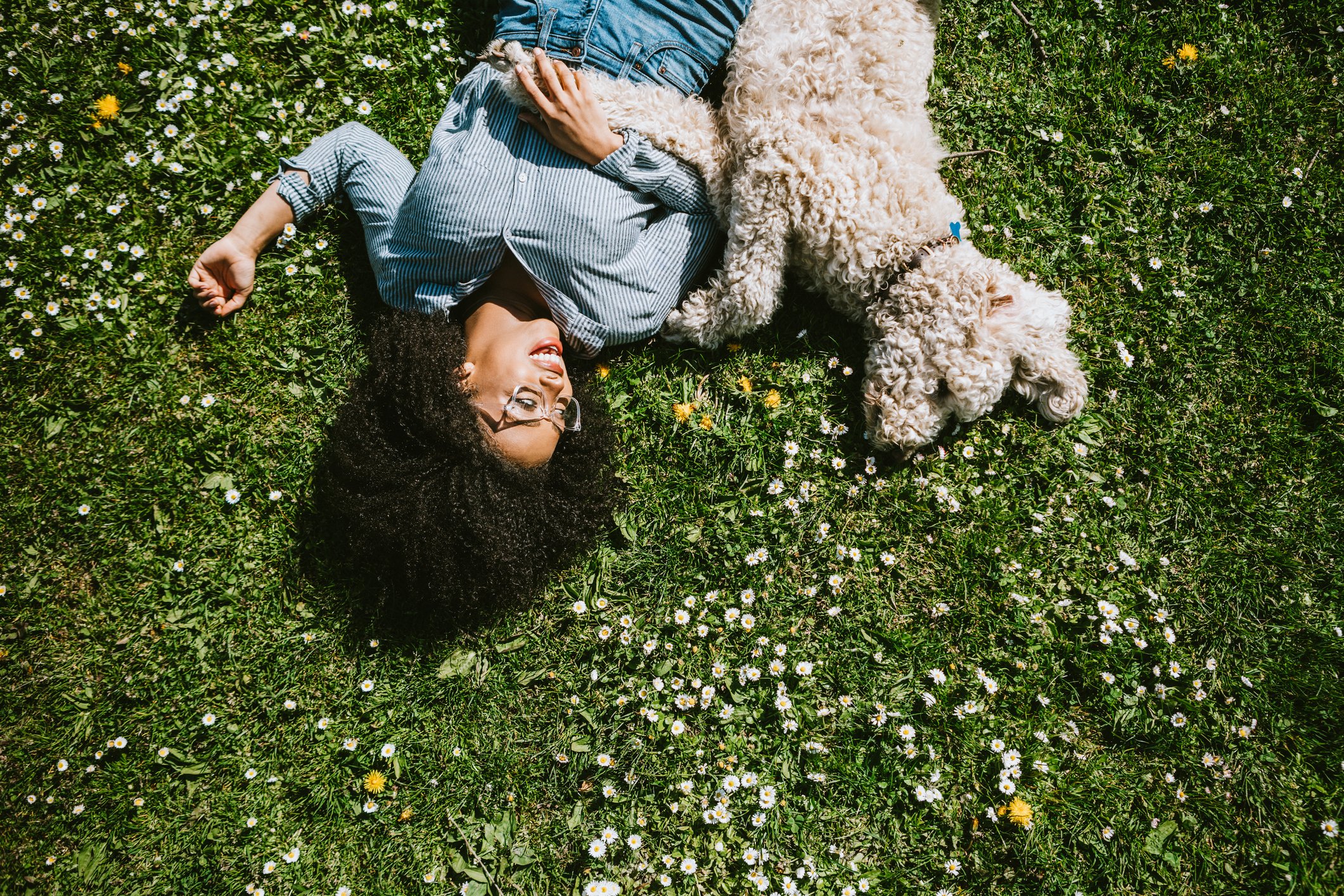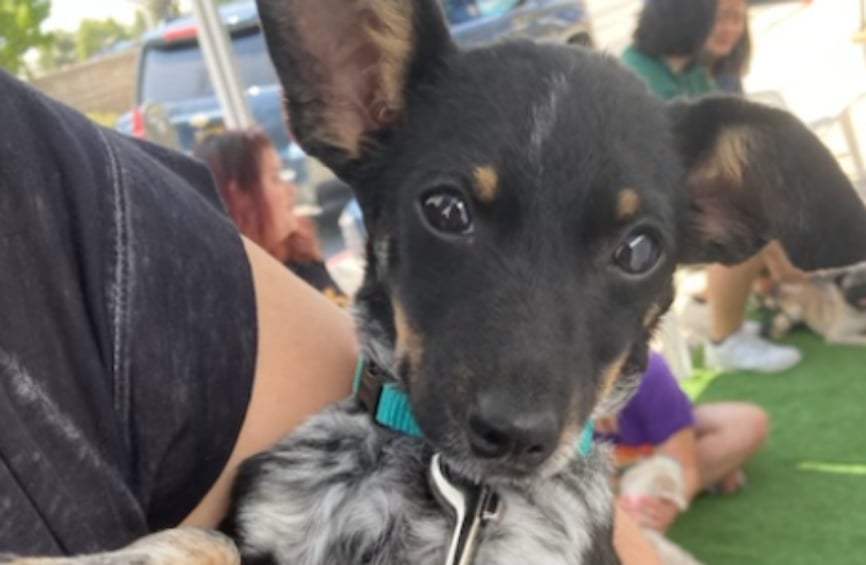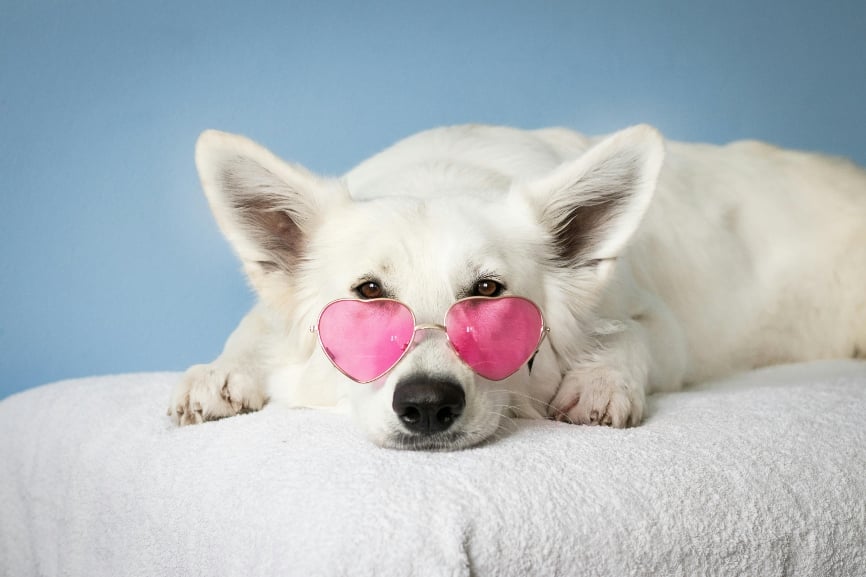Key Takeaways
- Dogs make eye contact and are relaxed with you if they are attached to you.
- They also are excited to see you and check in with you.
- Snuggling your stuff, listening to you, and seeking your affection are signs of a good human-dog bond.
- You can improve your bond with training sessions, playtime, and massages.
- Bonding happens naturally between dogs and people who care for them.
Table of Contents
Thanks to Rover and Elisabeth Geier for this guest post. Find her full bio below and keep reading to find out more.
Why is it so important to be bonded to your dog? It leads to a happier, healthier life together. That bond typically develops through your life with your dog, as you play, train, exercise, and live together.
From eye contact to greetings, this is how you’ll know if your dog is bonded to you. When they’re attached to you, dogs:
- Make eye contact
- Check in with you
- Are happy to see you
- Are relaxed with you
- Snuggle your stuff
- Listen and respond to you
- Seek out your affection
Bonded dogs are tuned into their humans. And new research about how dogs process language, as reported in ValueWalk, shows that dogs understand us more than we thought. Looking for more insight into your dog’s thoughts and feelings? Start with Dr. Stanley Coren’s indispensable How Dogs Think on dog psychology and Dr. Patricia McConnell’s For the Love of a Dog, all about dog emotions.
Now for the deeper dive!
They readily make eye contact
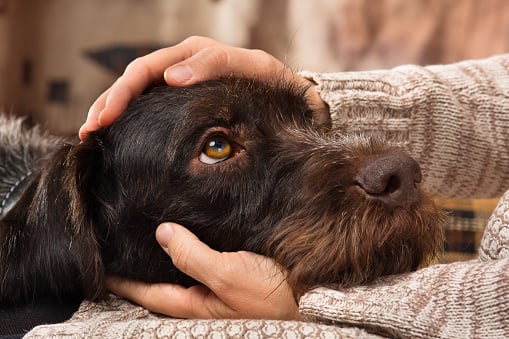
Eye contact is often the first things learned in basic obedience classes because it helps dogs focus. In the world at large, eye contact can be seen as a challenge, but in loving relationships, it’s a sign of trust and love. Think about your own eye contact habits; if you’re nervous or intimidated by another person, you might have trouble looking them in the eye, but if you trust them and want to show respect, you’ll meet their gaze. It’s very similar for dogs.
Eye contact isn’t just a sign of a strong bond between a dog and her person, it’s also a way to create and improve that bond. According to Japanese researchers, dogs who gaze at their owners show elevated levels of oxytocin (aka the love hormone), and the owners experience raised oxytocin levels, as well (source). In other words, gazing at each other starts a feedback cycle of love and attachment. That’s right: you can increase your bond and your happiness levels by gazing into each other’s eyes.
They check in on walks and in new environments
Dogs who are bonded to their people tend to look at them a lot. This doesn’t mean they’re glued to your side, gazing upon your face 24/7. They might still tug like crazy on the leash if they spot a pigeon, but they’ll return to you when it flies away.
Even the most adventurous, independent dogs typically show their connection by “checking in” from time to time. For example, my dog Ralph loves to go hiking, and tends to jog ahead of me on the trail, but always stops at a bend to turn back and check that I’m close behind. If your dog makes regular, visual contact with you in new environments, it means your bond is strong.
Similarly, a bonded dog is far less likely to run away. Bonded dogs tend to have a strong recall response, and will make sure their person is close by in new situations.
They freak out when you get home
Does your dog do a little dance or get a case of the zoomies when you come home? This one doesn’t take a veterinary degree to understand: they’re excited to see you! And chances are, you’re just as happy to see them. A happy, noisy, tail-waggy greeting is one of the surest signs you and your dog are connected.
Their body language is calm and relaxed in your presence
I know, I just said that if your dog is super-excited to see you, it means they’re in love! However, a bonded dog is also a comfortable dog. After the initial burst of excitement at your arrival, your dog probably settles down.
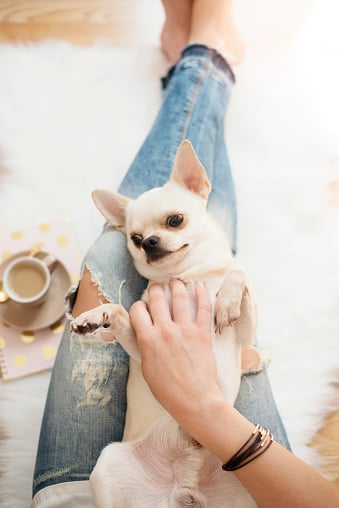 These are the most common types of relaxed body language in your dog:
These are the most common types of relaxed body language in your dog:
- A slightly open mouth, with a relaxed, lolling tongue
- Rolling over for a belly rub (this shows they trust you)
- Soft, relaxed facial expression
- Blinking eyes
- Tail wagging side to side
- A “bow” to invite and encourage play
A dog with relaxed body language that lays down and takes a nap by your side is showing you how much they trust you (and how much they like being close to you, another sign of a strong bond).
They carry your shoes around in their mouth
Dogs who are attached to their owners are also very attached to their scent, and may snuggle up with their belongings—particularly extra-stinky ones like clothing and shoes. Think of it from a dog’s perspective: scent is one of their primary means of communication, and your belongings communicate home, attachment, and love.
Of course, clothes- and shoe-snuggling isn’t always a good thing. If your dog hoards your dirty laundry or destroys your favorite pair of slippers, they may be exhibiting signs of separation anxiety. Otherwise, take it as a compliment! And invest in a few dog hair cleanup tools— and long-lasting chews like naturally-shed antlers that might entice them away from the shoes.
They listen when you speak and come when you call
Responsiveness is one of the biggest signs that you and your dog have formed a strong bond. If your dog listens to you when you speak, and obeys the commands you give, it shows that they’re attached to you. Basic obedience training is a great way to strengthen your bond.
Recall, or coming when called, is one of the most important cues for your dog to respond to, because it can keep her safe in potentially dangerous situations. But it’s also a great way to increase the bond between you two. Best Friends Animal Society suggests that you “make it a party” every time your dog comes when calls. No matter what they’re leaving behind, coming to you should be the best thing that happens to them all day!
They seek physical affection
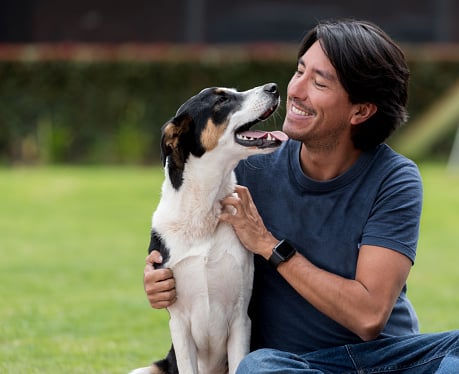
Recent headlines suggest that dogs may not enjoy “hugs,” but that doesn’t mean they hate physical affection. In fact, it’s among the most important bonding activity you can engage in with your dog. If your dog seeks out pets, leans, snuggles, and even hugs, it’s a sure sign they’re bonded to you. And you can strengthen your bond by spending quality, one-on-one time with your dog every day, including lots of gentle pets.
Of course, some breeds are less affectionate than others. but they’ll demonstrate their bond with other signs listed above.
Ways to improve the bond
If you’ve read through this list and are still worried, fear not: there are concrete steps you can take to increase your bond with your dog. The easiest (and most fun) is to spend at least 30 minutes of focused, one-on-one time together each day. This doesn’t include walks, yard time, or watching TV together. Your bonding time should be active and focused.
Here are a few bonding activities to engage in with your dog:
- Have a training session. Working on new skills, or reinforcing old ones, is a great way to bond!
- Try a sport like agility or flyball where you and your dog can work together as a team.
- Food (in healthy, appropriate quantities) is love! Aim for wholesome protein sources with limited fillers, and try some homemade meals for your dog. Make mealtime a bonding activity by integrating eye contact.
- Give your dog a grooming session or massage.
- Play fetch, tug, or hide and seek. Mix it up with twists on classic toysto keep their interest. (My dog is lately obsessed with the Chuckit Fetch Wheel.)
Of course, the best way to bond is simply to spend time with your dog and treat her like the amazing, unique, lovable best friend that she is. Bonding occurs naturally between dogs and the people who treat them well. Take good care of your dog, and she’ll reward you with a lifetime of love.
Psst: looking to make your dog’s life tastier—and yours easier? Rover readers can save 30% on your first Autoship Order with Chewy!
Content written by Elisabeth Geier. Elisabeth Geier is a professional writer, teacher, and rescue dog advocate with extensive dog handling experience. She has two beloved pit bulls of her own.
This post is brought to you in partnership with Rover. Founded in 2011 with headquarters based in Seattle, WA, Rover is the nation’s largest network of 5-star pet sitters and dog walkers.
